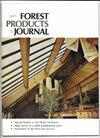Assessing Income and Risk of Incorporating Pine Straw Production into Slash Pine Plantations
IF 1.2
4区 农林科学
Q3 FORESTRY
引用次数: 0
Abstract
Slash pine plantation economic returns from both timber and pine straw producing perspectives were compared. Bare land values (BLVs) were calculated for site index 65 (base age 25) across three discount rates (4%, 5%, and 6%), three planting densities [545 (8 by 10 ft), 623 (7 by 10 ft), and 726 (6 by 10 ft) trees per acre], and two sets of timber prices (30-year and 10-year averages). Timber yields were obtained from the Cutover Slash Growth and Yield Simulator. Straw yields were estimated stochastically using a two-parameter Weibull distribution based on findings from a summary of pine straw yields and economic benefits in loblolly, longleaf, and slash pine stands. Straw production at an estimated average of 198 bales per acre (13 by 13 by 26 inches) improved net economic returns across all discount rates and planting densities. Increasing discount rates expectedly lowered BLVs. The BLVs varied much less across spacings, with planting at 7 by 10 ft being the preferred option. From 159 to 164 bales per acre were needed for pine straw operations to break even when planting 623 trees per acre depending on the discount rate. The distance from the average BLV to the 90th percentile was greater than the distance from the average BLV to the 10th percentile across strategies. This implied a greater potential existed for pine straw harvesting to improve BLV, but risk associated with a pine straw enterprise could reduce net income levels below simply choosing to forgo this activity.湿地松人工林引入松秸秆生产的收益与风险评估
从木材生产和松秸秆生产两个角度比较了湿地松人工林的经济效益。裸地价值(BLV)是为场地指数65(基准年龄25)计算的,包括三种贴现率(4%、5%和6%)、三种种植密度[545(8乘10英尺)、623(7乘10英尺和726(6乘10英尺的树木/英亩]以及两组木材价格(30年和10年平均值)。木材产量是从割草生长和产量模拟器中获得的。根据火炬松、长叶松和湿地松的稻草产量和经济效益总结结果,使用双参数威布尔分布随机估计稻草产量。秸秆产量估计平均每英亩198包(13乘13乘26英寸),在所有折扣率和种植密度下都提高了净经济回报。贴现率的提高预期会降低BLV。BLV在不同间距上的变化要小得多,7乘10英尺的种植是首选。根据折扣率,每英亩种植623棵树时,松树秸秆作业需要每英亩159至164包才能实现收支平衡。从平均BLV到第90百分位的距离大于从平均BLV到第10百分位策略的距离。这意味着松树秸秆收割有更大的潜力来提高BLV,但与松树秸秆企业相关的风险可能会将净收入水平降低到选择放弃这项活动以下。
本文章由计算机程序翻译,如有差异,请以英文原文为准。
求助全文
约1分钟内获得全文
求助全文
来源期刊

Forest Products Journal
工程技术-材料科学:纸与木材
CiteScore
2.10
自引率
11.10%
发文量
30
审稿时长
6-12 weeks
期刊介绍:
Forest Products Journal (FPJ) is the source of information for industry leaders, researchers, teachers, students, and everyone interested in today''s forest products industry.
The Forest Products Journal is well respected for publishing high-quality peer-reviewed technical research findings at the applied or practical level that reflect the current state of wood science and technology. Articles suitable as Technical Notes are brief notes (generally 1,200 words or less) that describe new or improved equipment or techniques; report on findings produced as by-products of major studies; or outline progress to date on long-term projects.
 求助内容:
求助内容: 应助结果提醒方式:
应助结果提醒方式:


